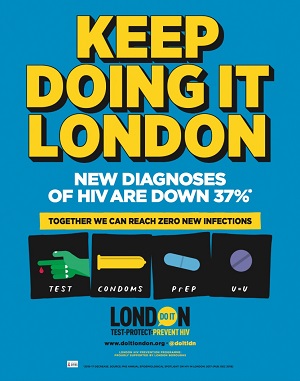Ealing backs new HIV education and prevention programme
|
Aound 36,000 people in London have HIV, with one in seven not knowing they carry the virus according to new figures.
But public health chiefs say the capital is on its way to achieving zero new HIV infections if Londoners keep making safer choices.
Do it London – part of the London HIV Prevention Programme run by the boroughs hs launched its campaign aimed at decreasing stigma surrounding HIV to encourage Londoners to get tested more often and practice safe sex, including condom use.

The goal of the campaign, in its second year, is to educate the public on the many ways to prevent getting the infection.
In Ealing, 34% of HIV diagnoses since 2015 were categorised as late. Late diagnosis causes delays in treatment and harm to health, as well as increasing the risk of onward HIV transmission, say local health experts.
Londoners who are diagnosed late are more likely to be heterosexual, including a significant number from black African communities – another key target audience for the Do It London campaign.
Public Health England figures (December 2018) show an overall 37% reduction in new HIV diagnoses in the capital since the boroughs began Do It London in 2015. New HIV infections in men who have sex with men (the group most affected by HIV in London), fell 40% in the same period.
Do It London’s campaign, which will run over summer and autumn, will promote to Londoners the many ways there are to prevent HIV, including through the ‘combination prevention’ approach based on robust scientific evidence:
· Increased and more frequent testing for HIV
· HIV treatment leading to an undetectable viral load, U=U (Undetectable = Untransmittable, meaning people on effective treatment cannot pass on the virus)
· Access to, and uptake of, Pre-Exposure Prophylaxis (PrEP) (a pill that protects against HIV infection)
· Condom use
Binda Rai, Ealing Council cabinet member for health and adults’ services, said: “Ealing is proud to collaborate and support the ‘Do it’ London-wide campaign to help to prevent the transmission and late diagnosis of HIV.
“Do it London helps ensure clear and consistent messaging on the various prevention methods that are proven to be effective. Great strides have been made in preventing HIV through the ‘combined prevention approach,’ but more needs to be done, including reducing the late diagnosis of HIV so that people can receive prompt treatment.”
Cllr Ray Puddifoot, London Councils’ Executive Member for Health & Care, said: “London is now not just a national but a global leader in HIV prevention.
“Through collaborating and jointly funding the Do It London public health programme, the boroughs’ commitment to tackling HIV has made a major contribution to the capital’s record of success. This approach ensures strong and consistent messages are communicated to Londoners about HIV prevention.
“Today we’re in the exciting position where London can achieve zero new HIV infections by 2030 if current trends continue. To maintain positive progress, it’s crucial that Londoners keep making safer choices – and that’s why our latest Do It London campaign is so important.”
Paul Steinberg, lead commissioner of the London HIV Prevention Programme, said: “The reduction in HIV diagnoses in recent years is a very promising development, not least because it means Londoners themselves are making effective choices to stop the transmission of HIV.
“But this is no time for complacency. That’s why London boroughs continue to work together to encourage everyone to prevent HIV, in order to achieve our ambitious target of zero new infections by 2030.
“The London HIV Prevention Programme is proud to have played its part in the continued downturn in HIV incidence, alongside London’s world-class sexual health services, our clinical colleagues, the HIV voluntary sector, and the communities most affected by HIV. London is now a Fast Track City, part of an ambitious global effort to end the HIV epidemic by 2030, and we will continue to lead the way in efforts to prevent HIV and combat the harmful stigma needlessly associated with the virus.”
Despite the overall reduction in HIV, there are still around 36,000 Londoners living with HIV and the capital continues to have a much higher new diagnosis rate than the rest of England (21.7 per 100, 000 versus 8.7).
Furthermore, 34% of HIV diagnoses in Ealing since 2015 were categorised as “late.” Late diagnosis causes delays in treatment and harm to health, as well as increasing the risk of onward HIV transmission. Londoners who are diagnosed late are more likely to be heterosexual, including a significant number from black African communities – another key target audience for the Do It London campaign.
8th July 2019